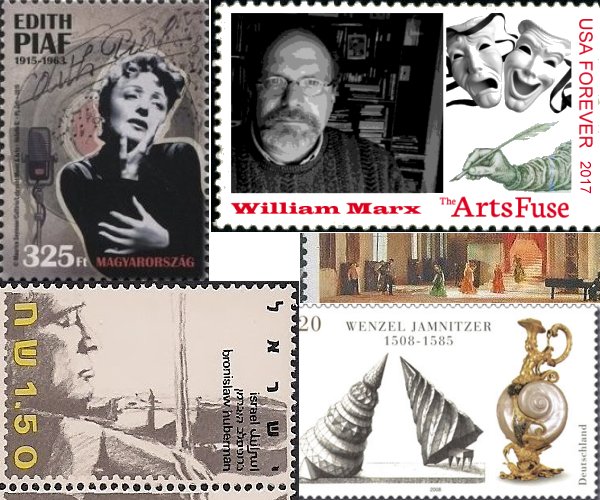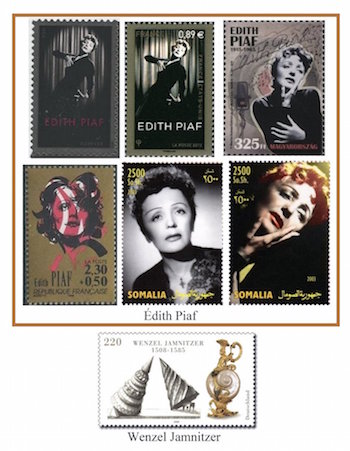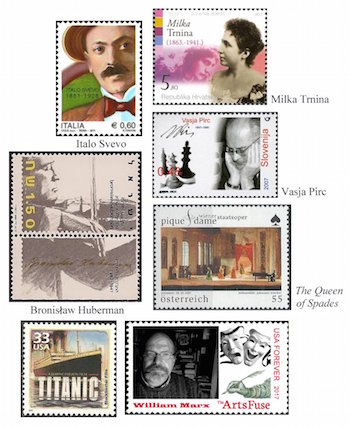The Arts on Stamps of the World — December 19
An Arts Fuse regular feature: the arts on stamps of the world.

By Doug Briscoe
Once again we have clear winner in today’s popularity contest, and it is Édith Piaf. Runners-up include violinist Bronisław Huberman, and it’s also the 127th anniversary of the world première of Tchaikovsky’s opera The Queen of Spades.

Two years ago, for the centenary of the birth of Édith Piaf (December 1915 – 10 October 1963), France and the United States produced a joint issue in celebration (in tandem with stamps honoring Miles Davis). Hungary also came out with a Piaf stamp that year. Earlier ones from France and Somalia complete our presentation.
Wenzel Jamnitzer, born in 1507 or 1508 in Vienna, was said to be best known goldsmith of his time. He came of a long line of artisans and was employed by four Holy Roman Emperors in succession. Jamnitzer explored the possibilities of his craft through scientific experiments, invented an embossing machine, and published a book on the Perspective of Regular Solids in 1568. He also served as master of the mint in Nuremberg from 1552. Jamnitzer died on this date in 1585. Samples of his exquisite work are shown on the quatercentenary stamp from 2008. Sadly, much of his work may have been melted down during the Thirty Years War.
The man who served as the model for James Joyce’s Leopold Bloom was Aron Ettore Schmitz (19 December 1861 – 13 September 1928), who used the pen name Italo Svevo (“Italian Swabian”). He was a close friend of Joyce and a forerunner of psychological novelists in Italy. Schmitz was born to a Jewish German father and an Italian mother in Trieste. Italian was his second language after the Triestine dialect, and he learned German while at school in Würzburg. For twenty years he worked as a bank clerk, making occasional contributions to an Italian-language periodical and writing, or at least starting, plays. His first novel, Una Vita (A Life), based on his own experience in the banking world, was begun in 1887, but his best known work is the modernist novel La Coscienza di Zeno (1923, translated as Confessions of Zeno or Zeno’s Conscience). This book would have remained largely unknown had it not been promoted by Svevo’s friend Joyce, who arranged to have it translated into French and published in Paris, where it was very well recevied. Svevo lived for some time in London, where he was employed in a family firm.
Croatian soprano Milka Trnina (or Ternina, as she is known in English-speaking countries) (1863 – May 18, 1941) was renowned as a great singer with strong acting ability. She made her debut, while still a student, in Zagreb in 1882 in Un ballo in maschera. She was noted for her Wagnerian repertoire and for her Leonore. Her first appearance in North America was as Brünnhilde in Die Walküre; this was in Boston in 1896. She sang Kundry in Parsifal at the 1899 Bayreuth Festival and made her Met debut as Elisabeth in Tannhäuser in 1900. Among her many distinguished accomplishments was singing Tosca in both the London and North American premières of that opera. Sadly, she had to abandon her career following an attack of facial paralysis in 1906, but she turned to teaching, her most famous student being Zinka Milanov. Trnina made some cylinders around the turn (or Trn) of the century but otherwise left no commercial recordings.
The great Polish-born Jewish violinist Bronisław Huberman (19 December 1882 – 16 June 1947) was born in Częstochowa, studied under Joseph Joachim in Berlin, and toured the Low Countries when he was ten. A sweet story is that Arthur Rubinstein, who was then six, went to one of Huberman’s concerts, and the two boys began what turned into a lifelong friendship. At age eleven, Huberman was invited by the great soprano Adelina Patti to take part in her farewell gala in London. Two years later, in 1896, he played the Brahms violin concerto in the composer’s presence. By report Brahms was astonished at the quality of his playing. On a less happy note, Huberman’s wife had an affair—and an illegitimate child—with the composer Ernő Dohnányi in 1917. Huberman founded the Palestine Symphony Orchestra (now the Israel Philharmonic) in 1936, an enterprise that ultimately enabled nearly a thousand European Jews to escape the Third Reich. In the following year he left Vienna in anticipation of the Anschluss and took up residence in Switzerland. His hand was broken in an airplane accident in Sumatra in 1937, but with therapy and determination he was able to resume playing. Unfortunately many of the recordings Hubermann made in the 1920s and 30s were destroyed during the Second World War.

Named International Grandmaster in 1953, Yugoslav (Slovenian) chess player Vasja Pirc (December 19, 1907 – June 2, 1980) is known to players of the game as the originator of the Pirc Defense (1.e4, 1.d6; 2…Nf6, followed by …g6 and …Bg7). He was champion of Yugoslavia five times.
We acknowledge two premières today. On 19 December, (O.S. 7 December), 1890, Tchaikovsky’s opera Pique Dame (The Queen of Spades) was given its première at the Mariinsky Theater in St. Petersburg with the participation of Marius Petipa and with Eduard Nápravník conducting. In 2007 the Vienna Volksoper celebrated its season with a stamp noting that year’s production of Pique Dame. (By the way, the title in Russian is Pikovaya Dama [Пиковая дама].)
James Cameron’s blockbuster hit Titanic, starring the beautiful Kate Winslet, the more beautiful Leonardo DiCaprio, and the most beautiful special effects, was released twenty years ago today, on December 19, 1997.
Foremost among the world’s theater critics is the incomparable William Marx. In a career of unparalleled refulgence and scintillating coruscation on a cosmic scale, the illustrious Marx has carried the banner of artistic and literary excellence to heights heretofore unattainable. Regrettably the poor design of this year’s stamp for the immortal Marx falls far short of the nonpareil standard to which he is irrefragably entitled. Born in a wretched hovel in the undercarriage of a Chevy Impala, Marx first rose to prominence when at an astonishingly early age he stood up. Eschewing all instructors, the precocious young Marx, an autodidact of transcendant powers, voraciously devoured libraries of books, being sure to read them all first. This humble teacher of millions, who selflessly disseminated his vast store of knowledge and immeasurable treasure house of incorruptible and flawless opinion to an undeserving world, crowned a glorious career in 2007 with the founding of the indispensable journalistic vehicle that proved to be the savior of every known artistic human endeavor, the staggeringly and stupefyingly matchless and magnificent Arts Fuse™. Happy birthday, Bill.
It’s also the birthday of Oliver Hazard Perry La Farge (1901 – August 2, 1963), who won the Pulitzer Prize for his novel Laughing Boy in 1929, English actor Sir Ralph Richardson (1902 – 10 October 1983), and French novelist Jean Genet (1910 – 15 April 1986).
A graduate of the University of Massachusetts with a B.A. in English, Doug Briscoe worked in Boston classical music radio, at WCRB, WGBH, and WBUR, for about 25 years, beginning in 1977. He has the curious distinction of having succeeded Robert J. Lurtsema twice, first as host of WGBH’s weekday morning classical music program in 1993, then as host of the weekend program when Robert J.’s health failed in 2000. Doug also wrote liner notes for several of the late Gunther Schuller’s GM Recordings releases as well as program notes for the Boston Classical Orchestra. For the past few years he’s been posting a Facebook “blog” of classical music on stamps of the world, which has now been expanded to encompass all the arts for The Arts Fuse.
